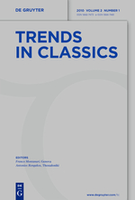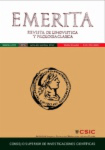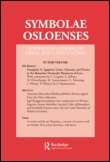
Trends in Classics
metrics 2024
Illuminating the intersection of history, literature, and archaeology.
Introduction
Trends in Classics is a distinguished academic journal published by WALTER DE GRUYTER GMBH, dedicated to advancing the field of Classics through critical scholarship and innovative research. With an ISSN of 1866-7473 and an E-ISSN of 1866-7481, this journal offers a platform for scholars from around the globe to share insights on classical literature, history, and archaeology. Indexed in Scopus and awarded a respectable Q4 classification in Classics, it ranks 48th out of 170 in the Arts and Humanities category, placing it in the top 72nd percentile—an indicator of its growing influence and contribution to the field. Operating from Germany, specifically from Genthin Strasse 13, D-10785 Berlin, the journal spans converged years from 2009 to 2024, fostering ongoing dialogues and developments within classical studies. Although it does not currently offer open access, its commitment to scholarly excellence makes it a vital resource for researchers, professionals, and students alike, who seek to deepen their understanding of ancient cultures and their lasting impacts on contemporary society.
Metrics 2024
 0.10
0.10 0.20
0.20 0.20
0.20 10
10Metrics History
Rank 2024
Scopus
JCI (Web Of Science)
Quartile History
Similar Journals

AMERICAN JOURNAL OF PHILOLOGY
Unveiling New Perspectives in Philological ResearchThe American Journal of Philology is a premier scholarly publication dedicated to the field of classics, literature, cultural studies, and linguistics. Published by Johns Hopkins University Press, this esteemed journal boasts an impressive reputation, reflected in its high impact factor and robust rankings—achieving a prestigious Q1 classification in Classics and Literary Theory, while securing a Q2 in Cultural Studies and Linguistics for 2023. The journal provides a rigorous platform for original research, critical essays, and innovative inquiries, contributing significantly to contemporary discourse in the humanities. Its comprehensive scope encompasses interdisciplinary studies, making it a vital resource for researchers, professionals, and students alike. Although it does not operate under an open-access model, the journal ensures that its content remains accessible to a wide audience through institutional subscriptions. With a publication history dating from 1972 to the present, the American Journal of Philology continues to be pivotal in fostering academic excellence and enriching the understanding of philological studies.

Emerita
Bridging the Past and Present in Language and ClassicsEmerita is a distinguished academic journal published by CONSEJO SUPERIOR INVESTIGACIONES CIENTIFICAS-CSIC in Spain, focusing on the fields of Classics and Linguistics. With its roots dating back to 1971, Emerita has established itself as an open-access publication since 1974, ensuring broad accessibility for researchers, professionals, and students alike. This journal's commitment to scholarly excellence is reflected in its 2023 Q2 classification in Classics and Q3 in Linguistics and Language, making it a vital resource for those engaged in classical studies and language research. In the Scopus rankings, it holds respectable standings, including Rank #76/170 in Arts and Humanities Classics and Rank #695/1088 in Language and Linguistics, demonstrating its significant presence and influence within these academic disciplines. The editorial office is located at Editorial CSIC, C/VITRUVIO 8, 28006 MADRID, SPAIN, where it continues to curate important research that contributes to the understanding and appreciation of classical literature and linguistic theory.

QUADERNI URBINATI DI CULTURA CLASSICA
Elevating Discussions in Classics and Literary TheoryQUADERNI URBINATI DI CULTURA CLASSICA is a distinguished academic journal dedicated to the interdisciplinary exploration of Classics, Linguistics, and Literary Theory. Published by ACCADEMIA EDITORIALE PISA-ROMA, this journal serves as a vital scholarly platform for researchers and professionals alike, facilitating in-depth discussions and analyses that contribute to these evolving fields. With an ISSN of 0033-4987 and an E-ISSN of 1724-1901, it boasts a robust Scopus ranking, placing it within the second quartile in Classics and the third quartile in related disciplines as of 2023. Although it is not an open-access journal, QUADERNI URBINATI DI CULTURA CLASSICA remains essential for those engaged in the study of language, literature, and classical cultures, encouraging scholarly exchange and innovation from its base in Rome, Italy. Researchers and students will find valuable insights and methodologies within its pages, making it a key resource for fostering academic growth and understanding.

Boletim de Estudos Classicos
Connecting Timeless Texts to Today's TeachingBoletim de Estudos Clássicos is a distinguished scholarly journal dedicated to the field of Classics and Education, published by COIMBRA UNIV PRESS. Since its transition to an open-access format in 2013, the journal has aimed to broaden the accessibility of high-quality research and critical discussions within these disciplines. Despite its current categorizations in the Q4 quartile for both Classics and Education, the Boletim has a unique opportunity to serve as a platform for emerging voices and innovative research, fostering growth in an otherwise underrepresented area. Based in Portugal, the journal invites contributions that encompass a wide range of topics, from ancient texts and historical analysis to educational methodologies and pedagogy. With an ISSN of 0872-2110 and an E-ISSN of 2183-7260, the journal actively seeks to attract researchers, professionals, and students dedicated to the exploration of classical studies. The journal's address is RUA DA ILHA, NO 1, COIMBRA 3000-214, PORTUGAL, where its contributors and editorial board strive to inspire a deeper understanding of classical heritage and its relevance to contemporary education.

Rivista di Filologia e di Istruzione Classica
Unveiling the Rich Tapestry of Classical TextsRivista di Filologia e di Istruzione Classica is a distinguished academic journal published by LOESCHER EDITORE, dedicated to advancing the fields of Classics and Linguistics. Based in Italy, this journal serves as a vital platform for original research, critical analysis, and scholarly discussions that enrich our understanding of classical texts and educational methodologies in the humanities. With its unique focus on the intricate relationship between classical literature and language, the journal aims to facilitate discourse among researchers, educators, and students alike. Although categorized in the fourth quartile in both Classics and Linguistics, it provides an essential venue for scholars seeking to disseminate their findings and engage with contemporary academic debates. The journal is indexed in various databases, though recent coverage in Scopus has been discontinued. Researchers interested in exploring the complex layers of classical philology and instructional practices are encouraged to contribute to and engage with the innovative scholarship presented in this journal.

Symbolae Osloenses
Navigating the Nuances of Classical HeritageSymbolae Osloenses, published by TAYLOR & FRANCIS LTD, is a distinguished journal in the field of Classics, with a rich history dating back to its inception in 1922. This UK-based journal has continuously contributed to the scholarly discourse surrounding ancient cultures, languages, and literature, making it a crucial resource for researchers, educators, and students alike. Though it operates under a subscription model, its impact on the academic community is underscored by its recent inclusion in the 2023 Scopus rankings, where it holds a respectable position in the 65th percentile among its peers. With decades of published research spanning from 1924 to 2023, Symbolae Osloenses remains committed to fostering robust academic dialogue and advancing knowledge in the Classics, catering to a diverse readership seeking to explore the nuances of classical studies.

RAMUS-CRITICAL STUDIES IN GREEK AND ROMAN LITERATURE
Navigating the Depths of Ancient Literary HeritageRAMUS: Critical Studies in Greek and Roman Literature, published by Cambridge University Press, stands as a premier journal dedicated to the exploration and analysis of classical literary texts. Established in 2002, this journal has garnered recognition in its field, achieving a Q1 category ranking in both Classics and Literature and Literary Theory for 2023, which reflects its commitment to scholarly excellence. With an impressive Scopus ranking, where it places in the 76th percentile for Literature and Literary Theory and the 70th percentile for Classics, RAMUS is a critical resource for researchers, professionals, and students engaged in the study of ancient texts and their lasting impact on contemporary literature. Although currently not an open-access journal, it offers a wealth of peer-reviewed articles, reviews, and critical essays that enrich understanding and foster discussions in the realms of Greek and Roman literary traditions. This journal not only serves as an academic platform but also contributes to the ongoing dialogue on the relevance of classical literature in today's cultural and literary discourse.

Journal of Classics Teaching
Exploring New Horizons in Classics TeachingThe Journal of Classics Teaching, published by Cambridge University Press, stands as a pivotal resource in the field of Classics education. Since its transition to Open Access in 2016, this journal has significantly broadened its reach, catering to educators, researchers, and students interested in classical studies. With an ISSN of 1741-7627 and an E-ISSN of 2058-6310, it offers a digital platform for scholarly articles that explore innovative pedagogical methods and curriculum developments in the Classics. Rated in the top quarter (Q1) for Classics and receiving recognition in the Scopus rankings, this journal encourages interdisciplinary dialogue and research collaboration between Classics and Education. The journal is poised to be an essential reading for those dedicated to enhancing the teaching and appreciation of classical antiquity, making it a vital publication for the advancement of knowledge in its field.

Cuadernos de Filologia Clasica-Estudios Griegos e Indoeuropeos
Cultivating Knowledge in Classical PhilologyCuadernos de Filologia Clasica-Estudios Griegos e Indoeuropeos, published by Universidad Complutense de Madrid, serves as a vital platform in the fields of Classics and Linguistics. With an ISSN of 1131-9070 and an E-ISSN of 1988-2637, this journal showcases rigorous academic research that spans both Greek studies and Indo-European linguistics. Recognized within the Q1 quartile in Classics and the Q2 quartile in Linguistics and Language, it highlights its standing among peers in these disciplines, particularly reflecting its commitment to advancing scholarly conversation. Though currently lacking in Open Access options, its emphasis on quality content ensures it maintains an intellectual influence, as evidenced by its ranking of #112 in Classics and efforts to engage researchers and students alike. The journal's coverage from 2011 to 2024 positions it as a rich historical resource, while its address in Madrid places it at the heart of European classical studies. By offering insights into the fundamental aspects of language, literature, and ancient cultures, Cuadernos de Filologia Clasica remains a critical resource for those seeking to deepen their understanding of the classical world and its enduring linguistic legacies.

GYMNASIUM
Reviving Ancient Wisdom for Modern LearningGYMNASIUM, published by Universitätsverlag C Winter Heidelberg GmbH, is an academic journal dedicated to the fields of Classics and Education. Since its inception in 1970, the journal has served as a platform for scholarly discourse, focusing on the intersection of classical studies and educational methodologies. Despite its discontinuation from Scopus coverage post-2021, GYMNASIUM remains an important resource for researchers, professionals, and students, fostering a deeper understanding of ancient texts and their relevance in contemporary educational frameworks. Current rankings place the journal in the Q4 quartile in both Classics and Education categories, reflecting its niche yet significant contribution to these fields. Researchers can access the journal's past issues through various academic libraries in Germany, enhancing interdisciplinary study and promoting scholarship across broader educational horizons.